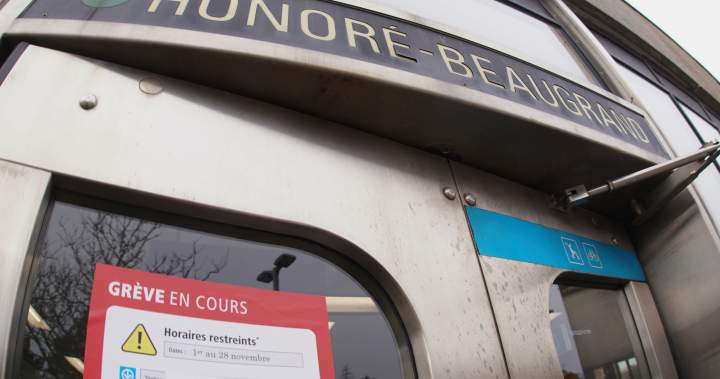Unless there’s a last-minute deal, there will be no public transit services offered by the Société de transport de Montréal (STM) this weekend.
A labour tribunal has given the go-ahead for the metro and bus drivers’ union to strike starting Saturday. The decision, handed down late Wednesday, is said to be a major disappointment for those caring for the vulnerable population.
At On Rock Community Services on Montreal’s West Island, staff say they are seeing the impact of the STM strike first hand. In recent weeks, clients have been missing appointments, arriving late, or resorting to whatever means they can to get to the centre, which offers support to low-income people and addresses food insecurity.
“We had a lady who had no way to get here. She lives nine or 10 km away. She accepted a lift from someone she did not know. By the time she got here, she did not want to go home with him, and he refused to leave until we threatened to call the cops,” said Kim Reid, the centre’s president.
Reid told Global News he fears more families will have trouble accessing the centre if the strike continues. He says the food bank will adjust and try to increase deliveries, but it is an added burden on staff.

Get daily National news
Get the day’s top news, political, economic, and current affairs headlines, delivered to your inbox once a day.
“People suffering food insecurity, they already have enough challenges. They don’t need one more,” he said.
Advocates in the health sector say the situation is similar.
“So many people count on public transportation to work, to go to the doctor — elderly people, people who don’t have a car,” said president of the Quebec Council for Patients Rights, Paul Brunet.
Uber, Bixi report surge in demand as Montrealers scramble
As people look for ways to get around during the shutdown, ride and bike-share services like Uber and Bixi say they are already seeing the strain.
In an email to Global News, Uber says it is encouraging passengers to share rides to save money and free up drivers. The company says it has capped dynamic pricing, is offering incentives to drivers to cut wait times, and warns users to expect longer waits and fluctuating prices during peak periods.
“Public transit is an essential part of Montreal’s mobility network. Like many Montrealers, we are monitoring the situation closely and hope it will be resolved quickly,” said Jonathan Hamel, Uber’s public affairs manager for Quebec.
Bixi said it is also reporting a higher demand since STM job action began. Between Oct. 31 and Nov. 12, Bixi recorded 473,412 trips, up from 433,607 during the same period last year — a 10-per cent increase.
The company says it increased dispatch operations to ensure bike and docking availability and added depot stations, using lessons from earlier strikes and high-traffic events.
Quebec parties remain at odds over legislation
The political standoff around the labour dispute in Quebec City continues. Labour Minister Jean Boulet tabled a bill Wednesday to fast-track Law 14, also known as Bill 89, to limit pressure tactics during the STM strike. Passing it required support from all three opposition parties, but Quebec solidaire still refuses to give its approval.
Premier François Legault confirmed Thursday he will not invoke closure to force the bill through, insisting the government has used that tool enough and placing responsibility back on Quebec solidaire.
Both the STM and the union say they are negotiating intensively in hopes of reaching an agreement before the weekend.
“But we must remind everyone that only the union has the power to suspend the strike, and we ask the union to reconsider given the considerable impact on the public,” said STM spokesperson Katherine Roux Groleau.
If no agreement is reached before Saturday at 4 a.m., there will be a complete shutdown of bus and metro service. Drivers and operators are set to walk off the job early Saturday.
Read the full article here

















